

Log In. To answer that question, Mr.
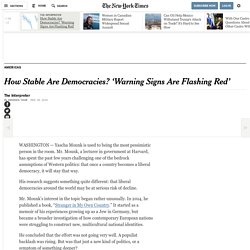
When economists ignore the human factor, we all pay the price. The Guardian recently asked nine economists whether we’re heading for another global financial crash and they gave many different answers.
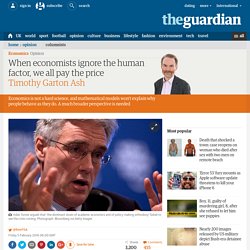
Yet still we turn to economists as if they were physicists, armed with scientific predictions about the behaviour of the body economic. Is Humanity Getting Better? Evidence matters when policymakers accept it and have the motive and opportunity to act on it. Why is there more tobacco control policy than alcohol control policy in the UK?
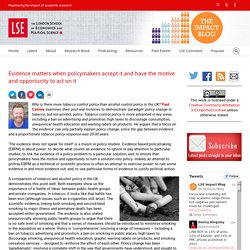
Paul Cairney examines their post-war histories to demonstrate ‘paradigm’ policy change in tobacco, but not alcohol, policy. Tobacco control policy is more advanced in key areas, including a ban on advertising and promotion, high taxes to discourage consumption, unequivocal health education and warning labels on products. He argues that a focus on ‘the evidence’ can only partially explain policy change, since the gap between evidence and a proportionate tobacco policy response was 20-30 years.
‘The evidence does not speak for itself’ is a truism in policy studies. Evidence based policymaking (EBPM) is about power: to decide what counts as evidence; to ignore or pay attention to particular studies; to link the evidence of a policy problem to a particular solution; and, to ensure that policymakers have the motive and opportunity to turn a solution into policy.
Does Language Influence Culture? (Please see Corrections & Amplifications below.)
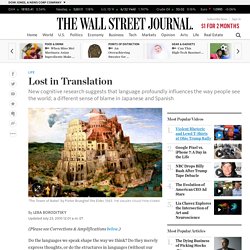
Do the languages we speak shape the way we think? Do they merely express thoughts, or do the structures in languages (without our knowledge or consent) shape the very thoughts we wish to express? 'I wanted to stay in North Korea,' says freed US detainee Matthew Miller. For most people visiting North Korea, the prospect of being arrested during their trip is a source of some concern.
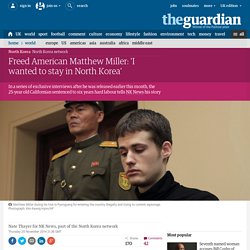
But for 25-year old Californian Matthew Miller, it’s exactly what he hoped for. “My main fear was that they would not arrest me when I arrived,” Miller told NK News in a series of interviews after he and fellow American Kenneth Bae were released during a high-profile visit to the North Korean capital by James Clapper, US Director of National Intelligence, earlier this month. “I was trying to stay in the country,” said Miller. Shutting our shores is not the way to silence misogyny or avert terrorism. Has immigration control become the answer to everything?
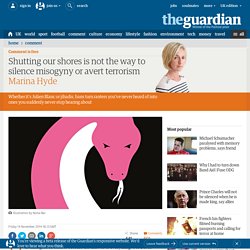
For David Cameron, it is the answer to how to deal with British jihadists who wish to return to the UK. Storytelling And Its Discontents Posted: Updated: Click here to watch the TEDTalk that inspired this post.
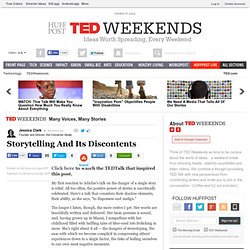
My first reaction to Adichie's talk on the danger of a single story is relief. All too often, the positive power of stories is uncritically celebrated. Here's a talk that considers their shadow elements, their ability, as she says, "to dispossess and malign. " The longer I listen, though, the more restive I get. Robert Skidelsky knocks the scientific halo off mainstream economists' teaching and research. LONDON – In last month’s European Parliament election, euroskeptic and extremist parties won 25% of the popular vote, with the biggest gains chalked up in France, the United Kingdom, and Greece.
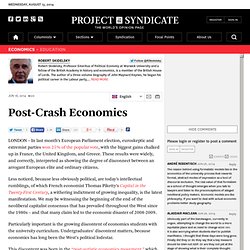
These results were widely, and correctly, interpreted as showing the degree of disconnect between an arrogant European elite and ordinary citizens. Less noticed, because less obviously political, are today’s intellectual rumblings, of which French economist Thomas Piketty’s Capital in the Twenty-First Century, a withering indictment of growing inequality, is the latest manifestation. We may be witnessing the beginning of the end of the neoliberal capitalist consensus that has prevailed throughout the West since the 1980s – and that many claim led to the economic disaster of 2008-2009. In the Name of Love. “Do what you love.
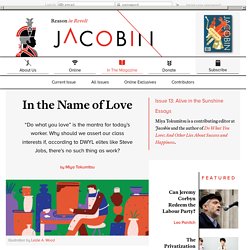
Love what you do.” We must end this sweet madness of excess sugar consumption. We have no physiological need for refined sugar: before the 16th century we managed with tiny amounts of it.
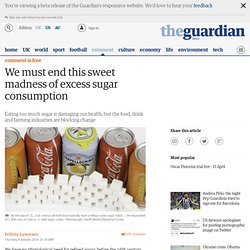
In fact, all the glories of Renaissance art and thought were created on just a teaspoonful of sugar per head per year. But by the 20th century sugar had become ubiquitous. Evidence-based policy making – Missing the woods for the trees? - MattAndrews. Guest post by Gulzar Natarajan, Harvard Kennedy School There is no denying that evidence should inform public policy design. However, it may be a matter of debate as to what constitutes evidence and how it should inform the policy design process. There may also be a need to revisit the interpretation of “external validity” of research findings beyond its current locational - geographical, social, and cultural - context. Conventional wisdom on evidence-based policy making predominantly views “evidence” as emerging from a process of scientific research.
Even within research, in recent years there has been a trend to seek evidence from field experiments, preferably randomized control trials. Disease resistance to antibiotics at tipping point, expert warns. The director of the Wellcome Trust has warned that resistance of disease to antibiotics has reached a tipping point at which it could creep into the UK almost without notice. Prof Jeremy Farrar said the effects would be gradual and would be seen not just in resistant new infections but in everyday medical practice and the treatment of everything from diabetes to minor wounds at risk of turning septic. Having worked in Vietnam for the past 18 years Farrar said he had already seen firsthand resistance to drugs in the shape of tuberculosis that had spread from patients' lungs to their brain. The heroism of Antoinette Tuff reveals what's missing from politics.
Richard Dawkins: My honey trap – why doesn't anyone believe in public-spirited concern? I was on the website of a bank. I patiently slogged through all my details, not forgetting mother's maiden name and name of first pet. With a sigh of completion I finally clicked submit. "We're sorry, our system is down this morning. Please try later. " David Simon: 'There are now two Americas. My country is a horror show' America is a country that is now utterly divided when it comes to its society, its economy, its politics. There are definitely two Americas. Richard Wilkinson : « Les inégalités nuisent à tous, y compris aux plus aisés » Richard Wilkinson à Paris, le 17 octobre 2013 (Pascal Riché/Rue89) L’épidémiologiste anglais Richard Wilkinson travaille depuis longtemps sur le lien entre les conditions sociales et la santé.
Ses recherches l’ont amené à faire une découverte : les inégalités de revenus aggravent une grande partie des maux sanitaires et sociaux d’une société (la maladie, la drogue, la délinquance, la défiance, le nombre de grossesses chez les adolescentes). On peut tirer diverses conclusions de ces travaux : l’enrichissement d’un pays s’accompagne d’une détérioration de sa situation sanitaire et sociale si seuls les riches deviennent plus riches ; à revenu moyen identique, une population marquée par les inégalités souffre nettement plus qu’une population plus égalitaire ; les inégalités n’affectent pas que les pauvres : même la santé des plus aisés est plus fragile dans une société inégalitaire !
Banned TED Talk: Nick Hanauer "Rich people don't create jobs". American basic income: An end to poverty? Photo by MANDEL NGAN/AFP/Getty Images This post originally appeared in Business Insider. A simple idea for eliminating poverty is garnering greater attention in recent weeks: automatically have the government give every adult a basic income. Social mobility and inequality: Upper bound. Review: The Spirit Level by Richard Wilkinson and Kate Pickett. We are rich enough. Economic growth has done as much as it can to improve material conditions in the developed countries, and in some cases appears to be damaging health.
Richard Wilkinson: How economic inequality harms societies. What does the inequality-immobility link mean? Tyler Cowen. Education and personal life[edit] The Inequality That Matters - Tyler Cowen. Why economic mobility measures are overrated. All Things Bright and Beautiful. Things I Forgot to Note at the Time: Tyler Cowen Doubles Down on His Claim That America Today Has too Much Income Mobiliy. Washington Center for Equitable Growth. How (not) to defend entrenched inequality. Running out of excuses. The Sons Also Rise. Global Rich List. Materialism: a system that eats us from the inside out.
Monsieur Made-in-France eschews foreign goods in name of patriotism. Enough is enough of the age of consumption. ‘In accord with spirit of the age’ Ayn Rand rewrote the story of capitalism to show that it is a necessary good. Boris Johnson invokes Thatcher spirit with greed is good speech. Boris Johnson: some people are too stupid to get on in life. Derek Bok on on policymakers' misconceptions of the role of higher learning.
Hear, All Ye People; Hearken, O Earth (Part One) Human cycles: History as science. Gramsci, une pensée devenue monde, par Razmig Keucheyan. Christian Salmon : « En période de crise, Hessel est la valeur refuge » Don't Act. Just Think. Critical Theory: Useful Distinction or Unconscious Smugness? Www.san.ed.ac.uk/__data/assets/pdf_file/0017/3419/is_economics_performative.pdf. Semiotics for Beginners by Daniel Chandler.